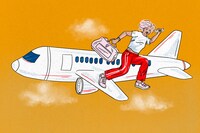You asked: What are the risks of skiplagging?
4 min read
Traveling has always come with complications. Our By The Way Concierge column will take your travel dilemmas to the experts to help you navigate the new normal. Want to see your question answered? Submit it here.
We’ll be returning from an overseas trip at the end of September. The first leg goes to New York before flying to Philadelphia, where we live in the suburbs. Our plans have changed, and we’re considering getting off in New York and not continuing home. We’re not trying to scam United, but we also don’t want to incur a hefty change fee by revising our itinerary. Can we not show up? Will we get in hot water with the airline if we don’t complete our itinerary? — Anonymous
The industry has a term for what you’re hoping to do: skiplagging. Also known to some travel hackers as “hidden-city ticketing,” it’s when you book a trip with the intention of getting off at a layover city and skipping the last leg(s).
Airlines do not want you to skiplag. They usually price flights with connections cheaper than direct flights, so sometimes skiplagging means you could be underpaying in their opinion, plus you left them with an empty seat they could have sold. They’ve been cracking down on skiplaggers and companies that promote the practice, such as Skiplagged.com.
But as you mentioned, you didn’t book your flight with the intention of duping the airline. Does intent matter?
“Travelers that go forward with skiplagging plans — intentional or not — are taking a risk,” Laura Lindsay, global travel trends expert at Skyscanner, said in an email.
She continued: “While a one-off occurrence could go unnoticed, any travelers that are repeat offenders run the risk of being flagged in the airline’s system and potentially banned from flying with the airline in the future.”
I reached out to United and a spokesperson pointed me to the airline’s Contract of Carriage, “namely sections J & K which address this,” they said over email.
In Rule 6, United spells out that skiplagging practices such as “Hidden Cities Ticketing” and “Point Beyond Ticketing” are prohibited by United and that defying the rules may come with punishment. That may be canceling the rest of your trip or voiding any associated electronic travel certificate or credit you have; permanently banning you from the airline; refusing to board you until you’ve paid the difference they determine; deleting your miles and taking away any elite status you may have; charging you a “delivery fee and penalty” set at their discretion; or taking legal action.
Jungho Suh, an assistant professor at the George Washington University School of Business, says airlines have taken irregular and inconsistent measures against skiplaggers, ranging from no action at all to the “very severe.”
In July, a teenager was caught trying to skiplag on an American Airlines flight out of Gainesville, Fla. The airline put two and two together when he checked in for his layover flight to North Carolina and had a North Carolina ID. His ticket was canceled, and he was required to book a new direct flight, according to the airline. The teenager’s father told the media that his son was banned from the airline for three years, but American later told The Washington Post that it had never banned the teenager.
You presumably don’t have a New York ID to tip off a gate agent. But there are risks beyond blowback from the airline.
First, you’d need to limit yourself to traveling with only a carry-on, because your checked bag could wind up being routed to your final destination. But Clint Henderson, an industry expert and a managing editor for the Points Guy, warns that even if you do stick to a carry-on, there’s the risk of being forced to gate-check to your final destination.
Then there’s the risk of having your travel plans rerouted because of weather or staffing issues. Your itinerary may change before your trip, and instead of passing through New York, you could have a Chicago layover instead.
So what are your options?
You could take the risk and plan to get off in New York, but Lindsay says that, given the recent pushback from airlines, the risk may not outweigh the potential cost savings.
Double-check to see whether you’d actually be saving in the first place. If you haven’t already, log in to your United account and see what it would cost to change your ticket; it may not be extra. I recently canceled a second leg of an upcoming United trip and got money back in the form of a travel voucher.
If it would cost you to change, you could also see whether you can cancel without a fee, take a flight credit and then rebook if a flight to New York is a similar price.
A previous version of this article said a teenager caught skiplagging on an American Airlines flight in July was banned from flying with the carrier for three years. The teen’s father told other media outlets that the ban had been imposed, however American Airlines says the teen was never banned. The article has been revised to clarify these details.



